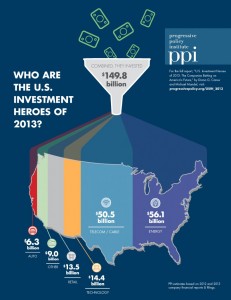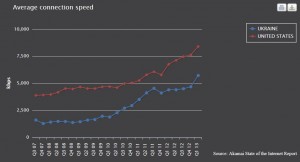PPI’s Investment Heroes List
 The Progressive Policy Institute (AKA “Clinton’s brain trust”) is on a roll. The latest memo in their “Investment Heroes: Who’s Betting on America’s Future” series lists the firms and sectors who made the greatest capital investments during 2012. Energy and telecom lead the sector list at $56.1B and $50.5B respectively, and the leading firms were AT&T and Verizon (see: page 5), at $19.5B and $15B respectively.
The Progressive Policy Institute (AKA “Clinton’s brain trust”) is on a roll. The latest memo in their “Investment Heroes: Who’s Betting on America’s Future” series lists the firms and sectors who made the greatest capital investments during 2012. Energy and telecom lead the sector list at $56.1B and $50.5B respectively, and the leading firms were AT&T and Verizon (see: page 5), at $19.5B and $15B respectively.
That’s a lot of money. To appreciate the scale of the telecom investment, bear in mind that the entire tech sector only invested $14.4B in 2012. The next time I hear a geek whining about low investment in U. S. broadband, I’ll have to ask why the number two telecom firm invested more than the entire tech sector did. Investment in broadband is proceeding at an incredibly rapid pace, despite economic conditions.
For contrast, check this article at InfoWorld by a North Carolina businessman, “The U.S.’s crap infrastructure threatens the cloud.” He complains about U. S. broadband speed, based on the NetIndex claim that our average speed is “33rd in the world, right behind the Ukraine.” In fact, Netindex cooks the books by ignoring connections when they estimate the “mean distance between the client and the server” is more than 300 miles. (note: Susan Crawford has also switched to using Netindex instead of the the Akamai data that used to place the U. S. in 22nd place worldwide because Akamai now shows we’re in 9th place.)
According to Netindex, the average speed of U. S. residential connections is only 19.49 Mbps compared to Ukraine’s 19.78, but Akamai rates U. S. average peak connection speed at 36.6 Mbps and Ukraine at 24.5 Mbps. What’s the difference? Netindex excludes business and rural connections, but Akamai includes every connection. Here’s a handy graph.
Source: Akamai State of the Internet Visualization
The significance of Netindex’ exclusion of commercial connections is important for those who want to build cloud computing applications and systems, as the InfoWorld columnist says he does.
Realistically, anyone who wants to provide a cloud service isn’t going to do so from an office in North Carolina or anywhere else, they’re going to place their servers in a collocation center where the server can be a few feet away from an Internet backbone. They’re also not going to place it in a Ukrainian residence.
As it happens I spent the last week in Ukraine, where my experience with broadband was quite illuminating. I watched a couple of baseball games in a five star hotel room in the capitol city, Kyiv, and didn’t have remarkable problems. The video quality from MLB.com wasn’t as good as it is on the 50 Mbps connection I have at home, but it was mainly serviceable aside from one dropout that lasted three innings.
Using Internet from Yalta was a different story, however: the best I could do was an intermittent audio stream despite the fact that the hotel claimed to have 300 Mbps 802.11n Wi-Fi. Yalta is a Black Sea resort 550 miles from Kyiv. It’s excluded from the Netindex data as I’m certain there aren’t any servers there. So there’s a universal service issue in that country that Netindex fails to capture.
Ukraine also happens to be the world leader in Internet piracy, but that’s more to do with political corruption and a low standard of living than anything else. Kazakhstan, for example, is a post-Soviet satellite like Ukraine, but its per capita GDP is three times higher than Ukraine’s thanks to good government, and the story for Poland is even more dramatic: GDP is four times higher than Ukraine, and both countries were equal before perestroika.
This is significant as the InfoWorld writer compares broadband to electricity and gripes about the speed/price ratio he’s offered. There’s a reason people who build high-capacity systems locate close to Internet backbones: the closer you are, the faster and cheaper your connections are going to be. That’s pretty much common sense, given that bits degrade with distance over any communication link. It’s also the case that poor countries like Ukraine are able to charge lower prices for broadband than U. S. users pay; their labor costs are ridiculously low, and their broadband is very lightly taxed.
Some are going to complain about American broadband service despite the facts; it’s more or less a sport, and the facts don’t matter to the complainers. As long as investment continues to flow into the system and we continue to lead in global Internet services, I won’t be joining the chorus.





I also noted how the goalposts have moved – now that Akamai shows US improvement, the complainers go looking for someone who says the US is “crap.”
All fine until it leads to “crap” policy….
[…] top of all that, American telecom firms invested $50.5B in 2012, largely on facilities […]